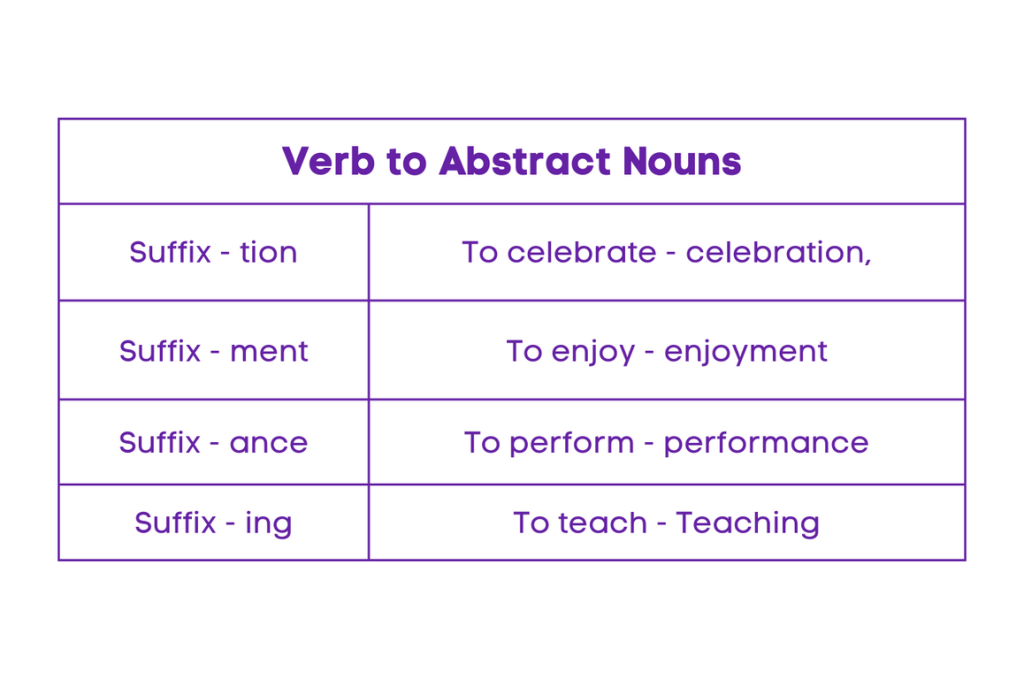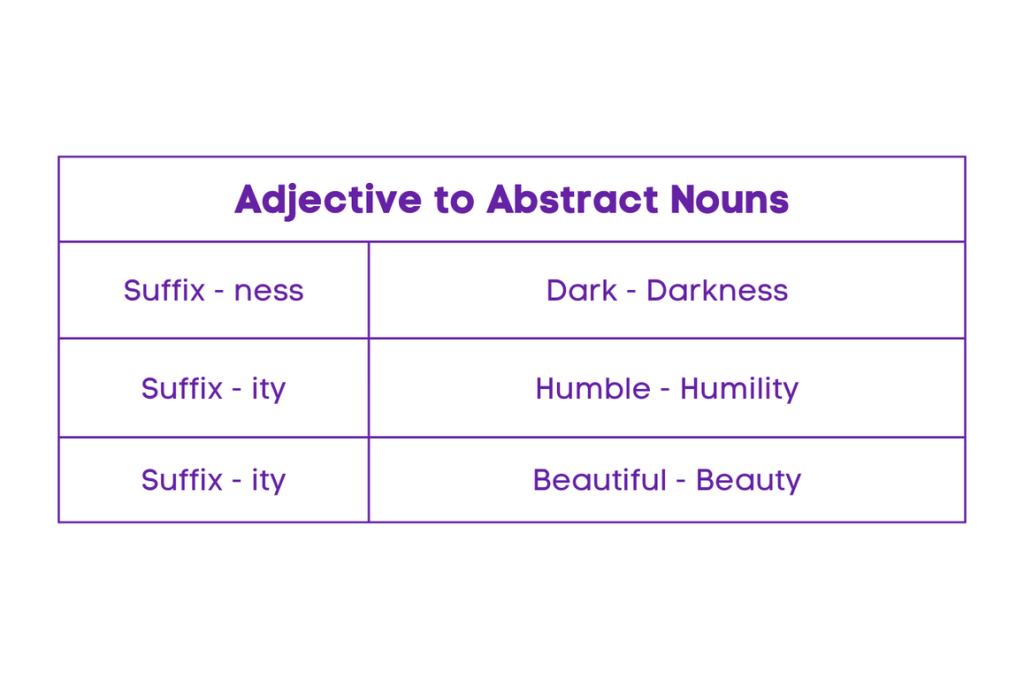What are Abstract Nouns? – Meaning and Definition
Table of Contents
Introduction
Abstract Nouns
In the world of grammar and language, nouns play a crucial role in conveying meaning and context. One specific type of noun that often perplexes learners is the abstract noun. Let’s delve into the realm of abstract nouns and explore their distinct characteristics and usage.
Analogy of Definition
What are Abstract Nouns?
An abstract noun refers to a type of noun that denotes something intangible, such as an idea, emotion, quality, or state. Unlike concrete nouns, which represent physical objects that can be perceived through the senses, abstract nouns encompass concepts that exist in the mind or as part of a broader experience.
Abstract Nouns vs Concrete Nouns
Distinguishing between abstract and concrete nouns is a breeze once you grasp the concept. If you can experience something through your senses—seeing, hearing, tasting, smelling, or touching—it’s a concrete noun. Conversely, if it exists beyond the realm of physical perception, it falls into the abstract noun category.
Consider the contrast between a river, a concrete noun, and freedom, an abstract noun. You can see the flowing waters of a river and feel its coolness, engaging your senses directly. In contrast, freedom is intangible; you can’t touch or see it directly, although its effects and expressions, like independence or liberty, are observable.
Method
Converting Verbs to Abstract Nouns
Converting verbs into abstract nouns is a simple yet powerful way to enrich your writing and convey deeper meanings. Verbs represent actions or states of being, while abstract nouns denote concepts, emotions, or qualities. By transforming verbs into abstract nouns, you elevate your language, adding depth and nuance to your expression.
To convert a verb into an abstract noun, you typically add a suffix such as “-tion,” “-ment,” “-ance,” or “-ing” to the verb root. For example, “to sing” becomes “singing,” “to achieve” becomes “achievement,” and “to invent” becomes “invention.”
Using abstract nouns in your writing allows you to capture intangible ideas or experiences, making your message more vivid and engaging. For instance, instead of saying “she solved the problem,” you could say “she demonstrated her problem-solving skills,” adding complexity and depth to the sentence.

Converting Adjectives into Abstract Nouns
Transforming adjectives into abstract nouns is a simple technique that enhances the depth and complexity of your writing. Adjectives describe qualities or characteristics of nouns, while abstract nouns represent concepts, emotions, or states of being. By transforming adjectives into abstract nouns, you can convey abstract ideas or experiences with clarity and precision.
To convert an adjective into an abstract noun, you typically add a suffix such as “-ness,” or “-ity”to the adjective root. For example, “happy” becomes “happiness,” “beautiful” becomes “beauty,” and “creative” becomes “creativity.”
Using abstract nouns derived from adjectives allows you to express intangible qualities or states in a more concrete and tangible manner. For instance, instead of saying “she is generous,” you could say “she exhibits generosity,” providing a deeper insight into her character.

Examples
Examples of Abstract Nouns
Example 1: Converting Verbs to Abstract Noun
to create – creation
to innovate – innovation
to establish – establishment
to disappoint – disappointment
to attend – attendance
to dance – dancing
Example 2: Converting Adjectives to Abstract Nouns
brave – bravery
sincere – sincerity
curious – curiosity
calm – calmness
gentle – gentleness
honest – honesty
Quiz
Tips and Tricks
1. Converting Verbs to Abstract Nouns
Tip: To convert a verb to an abstract noun, consider the action or state represented by the verb and transform it into a concept or quality.
Example: Verb “to sing” becomes abstract noun “singing.”
2. Adjectives to Abstract Nouns Transformation
Tip: When changing an adjective to an abstract noun, focus on the inherent quality or attribute conveyed by the adjective.
Example: Adjective “brave” becomes abstract noun “bravery.”
3. Identifying Abstract Nouns
Tip: Look for nouns that represent intangible concepts, emotions, or states, rather than physical objects or beings.
Example: “Joy” is an abstract noun denoting a feeling of happiness.
4. Abstract Nouns in Sentences
Tip: Pay attention to the role of abstract nouns in conveying deeper meaning and emotional resonance within sentences and expressions.
Example: “Her kindness touched everyone’s heart.”
5. Abstract Nouns in Literature
Tip: Explore the use of abstract nouns in literary works to understand their significance in evoking emotions and conveying complex themes.
Example: “Love” and “happiness” are recurring abstract nouns in poetry and prose.
Real life application
Story: “The Power of Abstract Nouns”
In everyday life, abstract nouns play a significant role in shaping our experiences and interactions. Let’s explore how abstract nouns manifest in various real-life scenarios.
Scenario 1: Expressing Emotions
Abstract nouns such as “love,” “joy,” and “sorrow” are instrumental in articulating our feelings and connecting with others on an emotional level. They form the foundation of human expression and empathy.
Scenario 2: Describing Qualities and Traits
Abstract nouns like “honesty,” “bravery,” and “kindness” define the moral and ethical fabric of society. They guide our actions and interactions, shaping our character and relationships.
Scenario 3: Conceptualizing Ideas and Beliefs
Abstract nouns encompass philosophical concepts, religious beliefs, and intellectual pursuits. They provide a framework for understanding the intangible aspects of human existence and thought.
FAQ's
Like? Share it with your friends

